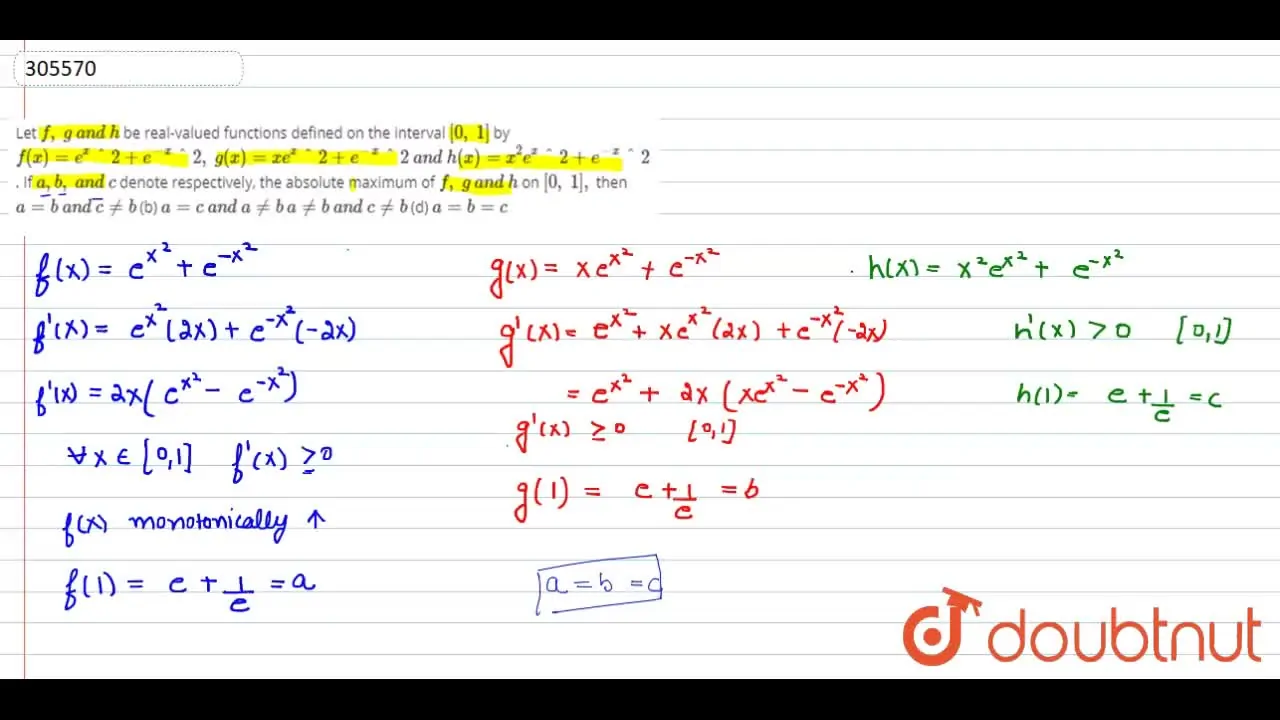Let be real-valued functions defined on the interval by . If denote respectively, the absolute maximum of on then (b) (d)
Step by step video & image solution for Let f,\ g\ a n d\ h be real-valued functions defined on the interval [0,\ 1] by f(x)=e^x^2+e^-x^2,\ g(x)=x e^x^2+e^-x^2\ a n d\ h(x)=x^2e^x^2+e^-x^2 . If a , b ,\ a n d\ c denote respectively, the absolute maximum of f,\ g\ a n d\ h on [0,\ 1], then a=b\ a n d\ c!=b (b) a=c\ a n d\ a!=b a!=b\ a n d\ c!=b (d) a=b=c by Maths experts to help you in doubts & scoring excellent marks in Class 12 exams.
Related Playlists
Similar Questions
Let f, g and h be real-valued functions defined on the interval [0, 1] by f(x)=ex^2+e−x^2, g(x)=xex^2+e−x^2 and h(x)=x2ex^2+e−x^2 . If a,b, and c denote respectively, the absolute maximum of f, g and h on [0, 1], then a=b and c≠b (b) a=c and a≠b a≠b and c≠b (d) a=b=c
View SolutionLet f,g and h be real-valued functions defined on the interval [0,1] by f(x)=ex2+e−x2 , g(x)=xex2+e−x2 and h(x)=x2ex2+e−x2. if a,b and c denote respectively, the absolute maximum of f,g and h on [0,1] then
View SolutionA shopkeeper bought a watch for Rs. 1200. At what price should he sell the watch to earn a profit of 25% ?
View SolutionIf a, b and c are respectively the coefficients of x2 in x2, 2x2+x and 2x−x2 respectively, then a+b+c= 0 (b) −2 2 (d) −1
View SolutionIf f, g, h are real functions defined by f=√x+1, g(x)=1x and h(x)=2x2−3, then find the values of (2fg+g−h)(1) and (2f+g−h)(1).
View SolutionThe function f(x)=xx decreases on the interval (a) (0, e) (b) (0, 1) (c) (0, 1/e) (d) (1/e, e)
View SolutionLet ef(x)=lnx. If g(x) is the inverse function of f(x), then g′(x) equal to: (a) ex (b) ex+x . (c) ex+ex (d) eex+x
View SolutionIn ABC, D, E and F are, respectively, the mid-points of BC, CA and AB . If the lengths of side AB, BC and CA are 7cm, 8cm, and 9cm, respectively, find the perimeter of DEF
View SolutionABCD is a parallelogram, E and F are the mid-points of AB and CD respectively. GH is any line intersecting AD, EF and BC at G, P and H respectively. Prove that GP=PH
View SolutionIn Fig.95, If AB, CD and EF are straight lines, then x= (a) 5 (b) 10 (c) 20 (d) 30
View Solution


